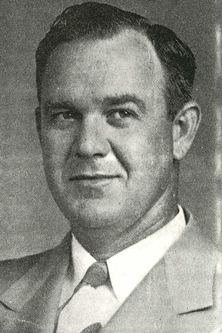
Fred P. Lawrence (1911-1978)
Inducted 1978
Highlights
Citriculturalist
Citrus Canker
Tristeza
Mediterranean Fruit Fly
Florida Rural Rehabilitation
Farm Security Administration
Budwood Registration Program
Bio
Fred P. Lawrence spent more than half a century as an important figure in Florida’s citrus industry, making his mark as a premier citriculturalist. Like many of Florida’s prominent twentieth citrus figures, Lawrence was not a native Floridian, having been born in Tennessee in 1911. During his early years, his family inhabited the small town of Lebanon, located near Nashville. His family became involved in Florida citrus through one his grandfathers, who had taken several trips to the Winter Garden area and became interested in the industry. He purchased a small producing grove of seedling trees that had survived the 1894-1895 freezes, located in west Orange County near the towns of Windermere and Gotha. When one of Lawrence’s other grandfathers fell ill, the entire family moved south because they thought the Florida weather would help his grandfather’s health, settling near the family’s groveland.
Lawrence credited his development as a citriculturalist to the experiences he had in his family’s grove during his childhood. He enjoyed experimenting with seeds, and was fascinated with the idea of creating new life out of plants that were rotten or had germinated. His family, which primarily sold fresh fruit, was one of the first to embrace the new technologies of the day, replacing their mules with tractors and owning an early Ford truck. He helped his family combat diseases such as citrus canker, tristeza, and creeping sickness. He eventually went to school at the University of Florida, but his schooling was interrupted by the devastating outbreak of the Mediterranean fruit fly. Like many others in Florida, his family was devastated when their grove was condemned as part of the government’s plan to fight the fruit fly. Although both this outbreak and the stock market crash of 1929 tremendously affected growers in Florida, his family managed to survive by selling the services of much of the equipment they had compiled, including sprayers, which was utilized in the control effort. Lawrence returned to the University of Florida and earned his DSA, MS.
In 1933, he began working for the Florida Rural Rehabilitation Corporation. Lawrence entered the Navy during the war years, serving on active duty from 1942-1946. Following his time with the Navy, he joined the Farm Security Administration, which became the Farmers Home Administration, which he participated in until 1974. He wrote or co-wrote many popular scientific articles on fruits and nut crops, leading to his international recognition as a citriculturalist.
Some of Lawrence’s most important contributions were with Florida’s agricultural extension service. He helped to get agricultural discoveries out to growers almost immediately after they were found. He was quoted as saying “Florida has the best educated growers anywhere.” He dedicated several groves to exploring new scientific discoveries, which he used to create a practical guide for others to follow.
When many Florida growers were moving into areas of poor drainage after freezes, Lawrence helped to open a new research station in Fort Pierce in order to study the effects of wetlands and poorly drained areas on citrus production. His contributions to forming a budwood registration program helped pave the way to the creation of a new arm of the Florida Department of Agriculture. He also helped to organize the Indian River Citrus Seminar, several Citrus Growers’ Institutes and the International Citrus short courses and county extension agent training schools. He was affiliated with the American Society for Horticultural Science and the Soil Science Society. He served as an advisor to the Citrus Committee of the Florida Bankers Association, and was also a member of groups responsible for the annual citrus spray and dust schedule.
After spending nearly half a century in the Florida citrus industry, Fred Lawrence was inducted into the Florida Citrus Hall of Fame in 1978.
